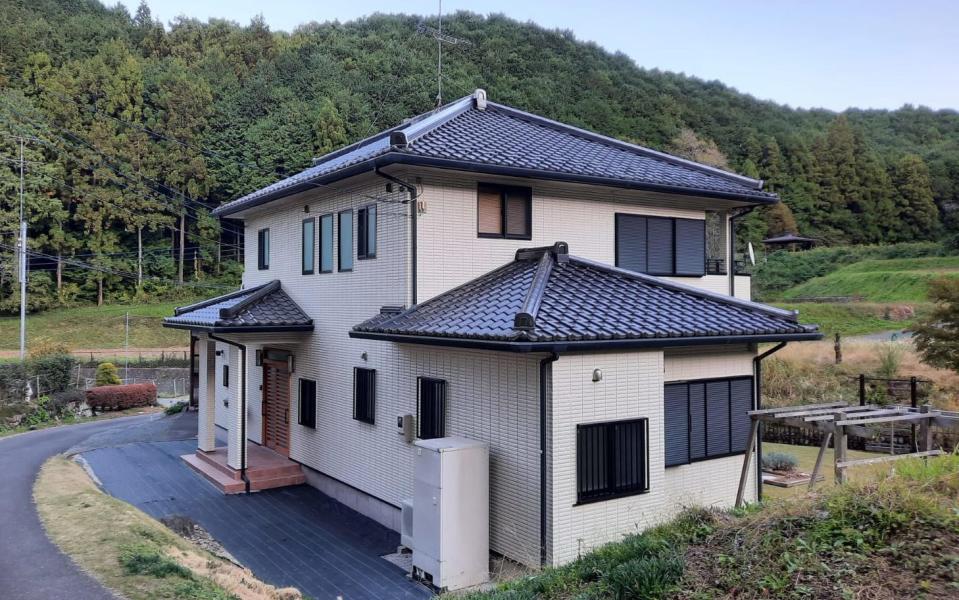When Paul Christie bought his house in rural Japan, locals were stunned.
It had been derelict for almost two decades and the latest available record for the property was a mortgage from the 1920s.
But the British expat was undeterred. He paid a little over £15,600 for the traditional single-storey, three-bedroom house set within rolling grounds.
It left him with enough money to carry out extensive renovations and build a home where he, his wife and four boys could “live the so-called good life”, he says.
“There were properties going for a song in the area, so I bought one and renovated it. We put in double glazing everywhere. We’ve got underfloor heating, a wood burning stove and a shower room.”
“Sometimes people come knocking on the door and say they are pleased by our house,” he tells me from his living room in Ota, a village on Japan’s southern island of Kyushu.
Most of the time houses like his will stay abandoned for good. Akiya, Japanese for “empty house”, are an increasingly common sight in Japan’s countryside.
Today there are thought to be approximately nine million of these abandoned homes across the country, the result of an ageing population and declining rural economy. They are usually valued at rock-bottom prices.
Christie, who moved to Japan in the late 1980s as a student and stayed to work for a Japanese media company, says most of his neighbours are octogenarians.
“All they have known is decline,” he adds. “Younger people have moved to the cities. In this village most of the businesses are farmers or old people’s homes, there’s not much else.”
But it’s changing rapidly, he says, as buying and doing up the houses as holiday homes or full-time residences has become a “big thing” amongst foreigners living in Japan.
Videos on TikTok and YouTube documenting akiya renovation projects have garnered millions of views. They boast of paying unbelievably low prices in exchange for picturesque Japanese homes nestled in breathtaking scenery.
‘I’ve been offered houses for free’
The 62-year-old, who now runs tour operator Walk Japan, bought his first vacant Japanese house in 2003 and has since purchased six more around Ota, most recently in 2017.
He has successfully renovated and rented out a handful to foreign visitors.
“All the properties I have rented out have become a very good source of revenue,” says Christie.
He found planning permission for his home improvements was easy to obtain.
“I have still got some properties that are undeveloped. The British system is very strict in comparison to Japanese land use. The locals, on the contrary, are very pleased when things are given new life because they have seen a long decline.
“The opportunities are massive because property prices are cheap outside the major cities. More and more are going to come on the market because people are dying.”
Younger generations who inherit the properties in the countryside from relatives can sometimes find them to be of little use.
Faced with paying an agent to find a buyer, or renovating the houses themselves, some choose to practically give properties away instead.
“I’ve been offered properties for free,” says Christie. “There was one, but I didn’t want it because it was very inconvenient. [For] another property nearby, a friend basically halved the price and we turned it into a guest house,” he adds.
He warned that it’s common to “spend a lot on a property and it [does] not hold its value, so you have to look at other returns like renting it out”.
There’s also the issue that foreigners are limited in how long they may stay in Japan. Tourist visas currently expire after 90 days, while the longer “sightseeing and recreation” visa lasts six months to a year.
The number of foreigners living in Japan has been steadily increasing for years and today sits at about over 3.2 million. After years of decline following the pandemic, British nationals in the country now number just under 20,000.
‘Japan can offer as much as the Cotswolds’
Parker Allen, of Akiya and Inaka, a real estate company which specialises in Japan’s vacant house market, says the Japanese countryside rivals many places in Britain for beauty and things to do.
“There are a lot of very beautiful areas in the UK. I have travelled extensively in the Cotswolds and I think that is a particularly beautiful area but it’s also very expensive and in high demand.
“In Japan there are regions like that which are also very scenic and there’s a lot of things to do and places to see, but the prices are nowhere near as expensive.
“That has to do with the fact that these houses are seen as depreciating assets.”
The 34-year-old, who moved to Japan in 2007 from Tennessee, in the United States, says that Japanese buyers prefer new-builds to old properties.
“In the UK, having a house in the countryside is seen as a luxury. The thing that really makes the Japan market different from other markets is that there is a strong preference for new construction.
“In Japan, the older a house is, the less it is worth. Houses are seen in Japan as a depreciating asset.
“If a property is 20 years old and it is a wooden structure, [it] is seen as valueless. A lot of the time you see these properties being sold for the value of the land.
“That, of course, is an opportunity and a risk. If you can find a property that is in a good condition, you can get a piece of land that just happens to have a free house on it which you can use.”

He adds: “There is a bit of a misunderstanding by a lot of people who think you can get these houses for free.
“There are properties like that but essentially 100pc of the time these properties are run down and not in liveable condition. We help clients find properties that are nearly turnkey.”
Buyers looking for a vacant home in Japan that is in liveable condition should be prepared to pay between ¥5m (£25,000) and ¥30m (£150,500).
He explains that many of the vacant houses are holiday homes dating back to the “economic miracle” Japan experienced after the Second World War.
“In Japan’s economic heyday in the 1970s and the 1990s, it was considered vogue for people with the wherewithal to have a second home [for it to be] in the countryside.
“But after Japan’s economic heyday ended and people didn’t have that much money to work with, people began neglecting these vacation homes or selling them.
“What has ended up happening is there are a lot of these holiday properties across Japan but there just isn’t as much interest in owning a home in the intensity as there was previously. We’ve got a lot of supply and not very much demand.”
‘I couldn’t buy a bedsit in Birmingham for the price I paid’
Shabeur Rahman, a British expat and physicist in his mid 40s, was able to find one of the few vacant houses in Japan’s countryside that was ready to move into straight away.
“The place that grabbed me was this detached property overlooking some rice fields with traditional Japanese architecture, and it didn’t require any work,” he says.
He decided he wanted to spend more time in Japan after having a “wonderful time” in the country during an internship in Yokohama in 2009.
He uses the property, in Ogawamachi, near Tokyo, as a holiday home when he is not travelling for work between Britain and the United Arab Emirates.
“For the price I paid I don’t think I would get a one-bedroom apartment in Birmingham.
“It’s a three-bedroom house with 186 square metres of interior space. It’s a very good price and [it was] just a cash transaction,” Rahman says.


“The plan is to go there as a holiday home and spend three or six months a year on a tourist visa there.
“There are a lot of opportunities there, especially in the local area, in terms of the organic farming culture and outdoor activities such as hiking trails,” he adds.
Andrew Davies, 60, recently retired from working as a university lecturer and purchased an akiya on the Kunisaki peninsula, Kyushu, paying just £20,000.
“It’s a property with a house and a big barn,” he says. “[The potential] renovations on the barn are really appealing, it has a huge structure that could turn into something really exciting.
“I was thinking possibly for a small amount of accommodation, two or three rooms, and open it up into a café-bar.”
“The connection with the local culture and local people is really key,” he adds.
Many places in rural Japan are filled with older people living on their own. “If you can be involved in those, that’s really good.”


Source Agencies



